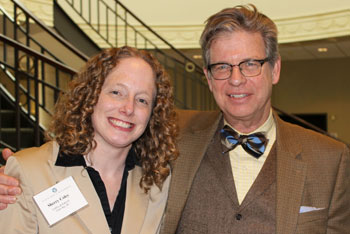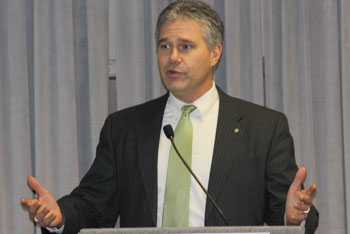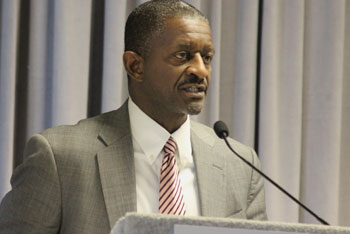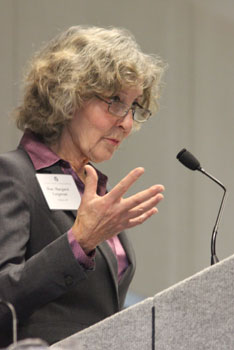
Sherry Coley and Arthur Harrington are cochairs of Challenges Facing New Lawyers Task Force. In 2012, then-president Jim Brennan appointed 10 members to the task force. Coley and Harrington presented the report’s findings to the board.

Attorney General J.B. Van Hollen speaks to the board about his time as the attorney general for the state. He will leave office when his third term expires.
Visit the State Bar of Wisconsin on Facebook for more photos of this event, or click here.
Dec. 6, 2013 – The State Bar of Wisconsin’s Board of Governors took action on several rule change petitions today, among other business at its meeting in Madison.
The 52-member board voted to support three petitions currently pending before the Wisconsin Supreme Court. One gives guidance to judges dealing with pro se litigants.
Another petition gives guidance to lawyers who provide limited-scope representation to clients. The third petition proposes a fee hike for pro hac vice admissions.
The board also voted to oppose federal draft legislation that would prohibit law firms and other professional service firms from using the cash method of accounting to compute taxable income, and heard the findings and recommendations of a new report concerning the challenges facing new lawyers (read today’s companion article “New Report Highlights Struggles for New Lawyers, Recommends Ways to Ease Financial Burdens”).
In addition, state Attorney General J.B. Van Hollen spoke about his time in office (see sidebar). Van Hollen, who has served as Attorney General since 2007, recently announced that he will not seek re-election.
Board Supports Judicial Code Amendment Addressing Pro Se Litigants
The board voted 37-3 to support rule changes that would provide more guidance to judges when dealing with self-represented (pro se) litigants, who increasingly appear in Wisconsin’s courts.
The Wisconsin Access to Justice (ATJ) Commission is requesting rule changes through petition 13-14, submitted to the Wisconsin Supreme Court in September 2013.
J.B. Van Hollen Explains His Role as Attorney General
“In the practice of law, I find that even though philosophy has impacted attorneys general throughout the history of this state … I don’t think philosophy necessarily should,” Attorney General J.B. Van Hollen told the State Bar’s Board of Governors.
The State Bar board invited Van Hollen to speak at its board meeting today at the State Bar Center. Van Hollen recently announced that he will not seek reelection after serving in office since 2007. When asked what he will do next, he said he was still weighing his options. But Van Hollen did offer a glimpse into the workings of the Wisconsin Justice Department and his role as attorney general.
“I think it’s quite simple that the rule of law prevails, that’s it – not what I wish the rule of law should be, not what I would like it to be or think I can transform it into by my various actions through bringing or defending lawsuits,” he said.
“We try, in our best opinion, to interpret what the law is, give legal advice, give defense, and give representation based upon what that interpretation of the law is.”
Van Hollen said regulatory, tax, and political climates can be questionable in Wisconsin, but “the legal climate shouldn’t be.”
The core of the proposal amends the Wisconsin Code of Judicial Conduct to balance a judge’s duty to be impartial with the duty to provide a fair process for pro se litigants.
Specifically, the proposed rules clarify that judges do not violate their ethical obligations of fairness and impartiality in making “reasonable efforts to facilitate the ability of all litigants, including self-represented litigants, to be fairly heard.”
A comment explains that judges may take reasonable steps to ensure fairness, which includes explaining legal concepts to pro se litigants in everyday language or providing information or explanations, among other potential steps
“This is an issue that is important to judges and to the courts as a whole considering the increasing numbers of persons appearing in court without representation,” said former Appeals Court Judge Margaret Vergeront, appearing on behalf of the ATJ Commission. “Judges need guidance on this issue and that’s what the petition does.”
District 7 Gov. John Orton, Mauston, asked whether the proposed changes might allow judges to disregard the rules of procedure and evidence in cases involving pro se litigants.
“I don’t want this to be viewed by the courts as saying, ‘well, whenever someone comes in unrepresented, that means the rules of evidence never apply and procedure will just be whatever the judge thinks is ‘fair,’” Orton explained.
Vergeront says the rules do not relieve judges from upholding and applying the law. “The intent of the drafters and the meaning of the language in the rule and the comment makes clear that this does not give judges leeway to not follow the law,” she said.
Vergeront also noted that the proposed rule changes are not unique to Wisconsin. Similar language was inserted into the ABA Model Judicial Code in 2007, and 24 states and the District of Columbia have similarly amended their judicial codes.
Board Supports Limited-Scope Representation Petition, With Caveat
The board pledged support for a petition submitted by Director of State Courts John Voelker on behalf of the Wisconsin Supreme Court’s Planning and Policy Committee (PPAC). The petition (13-10) provides structure for providing limited-scope legal services.
One purpose of limited-scope representation is to give more citizens access to lawyers through discrete, affordable services, reducing the number of pro se litigants.
Although Wisconsin Supreme Court Rules allow lawyers to provide limited-scope representation, there is currently no structure or guidance on how it should be done, says Mary Wolverton, co-chair of PPAC’s limited scope representation subcommittee.

Judge Carl Ashley, Milwaukee County Circuit Court, gives an update about the upcoming Diversity Task Force Report. President Patrick J. Fiedler appointed the task force to determine the State Bar’s role in promoting and furthering diversity within the law schools, the profession, and the State Bar by identifying an approach to diversity that will serve the Wisconsin legal profession.
“Lawyers are understandably reluctant to provide these services without any structure or guidance,” said Wolverton, who appeared to ask for the board's support for the the petition.
The proposed rules outline the process as well as the rules to be considered in providing limited scope services. The proposal also spells out rules relating to “ghostwriting.”
The proposal requires a client’s informed consent, in writing, which outlines the limited-scope services to be performed. The State Bar’s Business Law Section opposes the requirement that informed consent be in writing for transactional work. Milwaukee lawyer Emory Ireland appeared on behalf of the Business Law Section.
According to Ireland, the section believes a writing requirement “would impose an unnecessary administrative burden on business lawyers” who frequently engage in limited-scope representation in ongoing transactions with sophisticated business clients.
Recognizing this concern, the board voted to support the petition as applied to litigation and administrative proceedings but requested that the Wisconsin Supreme Court consider the concerns of the Business Law Section when reviewing the petition.
Board Opposes Legislation to Force Accrual Method of Accounting
The board took a policy position to oppose draft federal legislation that would require law firms and other personal service firms with annual revenues over $10 million to compute taxable income on the accrual rather than the cash method of accounting.

Former Appeals Court Judge Margaret Vergeront, on behalf of the Access to Justice Commission, seeks support for petition that would give guidance to judges who are dealing with pro se litigants.
Currently, entities with income over $5 million in revenue must use the accrual method, other than professional service firms, according to District 9 Gov. Brian Anderson, Madison.
The legislation was drafted by Rep. Dave Camp (R-MI), who is the chairman of the House Ways & Means Committee, and released in March 2013. In November, the ABA’s Board of Governors adopted a resolution opposing the legislation. The ABA’s resolution was co-sponsored by seven ABA sections and divisions, as well as other state bars. The American Institute of Certified Public Accountants also opposes the legislation.
Camp’s proposal is found in section 212 of the committee’s proposed Tax Reform Act of 2013. Wisconsin attorneys Michelle Behnke and Christina Plum said the provision would cause significant financial hardship to many law firms and other professional service firms “by forcing them to pay tax on income they have not yet received and may never receive.”
“In essence, this is an effort to speed up tax revenue,” said Behnke, former State Bar of Wisconsin president and now the Wisconsin Delegate to the ABA House of Delegates. Plum is the State Bar of Wisconsin Delegate to the ABA House of Delegates. Both appeared at the board meeting to explain the proposed accounting changes.
Board Supports Proposed Fee Hike for Pro Hac Vice Admissions
The board backed a petition submitted by the Board of Administrative Oversight and the Office of Lawyer Regulation to increase the fee for admission pro hac vice from $50 to $200. That fee could be waived if the out-of-state counsel represents indigent clients.
Judge Carl Ashley Updates Board on Diversity Task Force's Work
Milwaukee County Circuit Court Judge Carl Ashley, chair of the State Bar’s Diversity Task Force, updated the board on the task force’s effort to develop a more diverse and inclusive legal profession.
The petitioners say Wisconsin’s current pro hac vice fee is well below the national average, and applications require significant time and effort to process. Between January 2009 and February 2013, more than 3,500 pro hac vice applications were filed.
Board Supports Legal Assistance Committee Pro Bono Message
The board voted to support and distribute a message developed by the State Bar’s Legal Assistance Committee to encourage State Bar groups to develop plans to expand pro bono services and outreach, develop pro bono projects and resources, and support and advocate for increased pro bono involvement by members.
The State Bar has set a strategic goal of increasing member delivery of pro bono and modest means services as a way to assist underserved members of the public in need of legal services.
The Legal Assistance Committee’s message, which will be distributed to all State Bar sections, divisions, and committees, encourages members, staff, and leaders of State Bar groups to help the bar meet this goal.
Board Adopts Position on Tax Fairness for Discrimination Victims
On the recommendation of the board’s policy committee, the board adopted the following policy position on tax fairness relating to discrimination victims:
"The State Bar of Wisconsin supports legislation that allows noneconomic damage awards for unlawful discrimination, including employment discrimination, civil rights, and whistleblowers, to receive the same federal tax treatment as noneconomic damage awards for personal injury. Specifically, the tax code should exclude noneconomic damages for unlawful discrimination from gross income, permit income averaging for back pay and front pay amounts received in a lump sum, and exempt any tax benefit resulting from income averaging from the alternative minimum tax. This tax treatment will both reduce costs to litigators and increase recovery for those who are the victims of this discrimination."
Other Business
The board approved the Public Interest Law Section’s request to amend its bylaws to “reflect the current practices of the Section and the Board, as well as incorporate changes in technology,” including voting by electronic means.
The board also approved the Solo Small Firm & General Practice Section’s request to amend its bylaws to “align current practices” and reflect a merger with the Agricultural Law Section and the Law Practice Management Section.
Visit the State Bar of Wisconsin on Facebook for more photos of this event, or click here.
